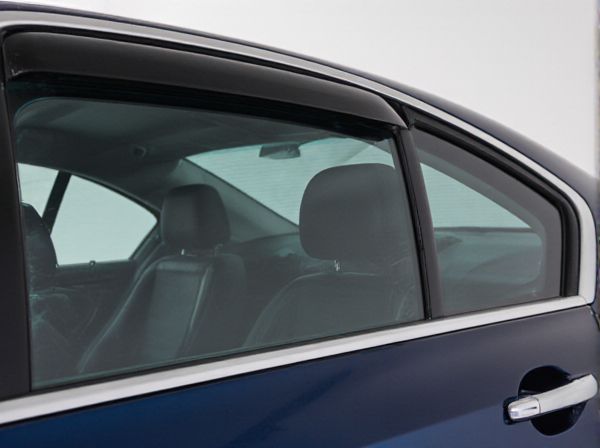
Photo illustration: Privacy Glass vs Tinted Glass
Privacy glass offers enhanced concealment by limiting visibility from the outside while maintaining a clear view from within, making it ideal for protecting your personal space. Tinted glass primarily reduces glare and heat from sunlight, improving comfort and energy efficiency inside the vehicle. Choosing between privacy and tinted glass depends on whether your priority is privacy or sun protection.
Table of Comparison
| Feature | Privacy Glass | Tinted Glass |
|---|---|---|
| Description | Factory-installed glass with a darkened, baked-in tint. | Aftermarket or factory-applied film for window shading. |
| Visibility | Reduces visibility from outside; maintains clear view inside. | Varies by tint percentage; can reduce visibility both ways. |
| Heat Rejection | Moderate heat rejection via tinted glass material. | High heat rejection with specific film technologies (e.g. ceramic). |
| UV Protection | Blocks up to 35% UV rays. | Blocks up to 99% UV rays depending on film type. |
| Durability | Permanent and maintenance-free. | Film may fade, peel, or bubble over time. |
| Legal Considerations | Complies with most regulations as factory glass. | Subject to state and country tinting laws; may require inspection. |
| Cost | Included with the car; no additional cost. | Ranges from $100 to $400+ depending on quality and coverage. |
| Installation | Factory-installed; no extra steps. | Requires professional or DIY installation of film. |
Introduction to Privacy Glass and Tinted Glass
Privacy glass is a specialized type of automotive or architectural glass designed to reduce visibility from the outside while allowing light to pass through, often achieved through a darkened or reflective coating. Tinted glass, on the other hand, involves the application of a colored film or inherent coloration to reduce glare and block UV rays, enhancing comfort and energy efficiency. Both serve distinct purposes: privacy glass primarily ensures occupant privacy, whereas tinted glass focuses on light control and heat reduction.
What Is Privacy Glass?
Privacy glass, often referred to as privacy tint, is specially manufactured automotive glass designed to reduce visibility from the outside while allowing occupants to see clearly from within. This glass has a built-in dark tint or shading embedded during production, unlike traditional tinted windows where film is applied afterwards. Privacy glass enhances passenger comfort, reduces glare, and offers increased UV protection without compromising window integrity.
What Is Tinted Glass?
Tinted glass is a type of window glass treated with a colorant that reduces glare, blocks ultraviolet (UV) rays, and limits heat transmission, enhancing energy efficiency in vehicles and buildings. Unlike privacy glass, which darkens the interior side for increased concealment, tinted glass primarily focuses on managing sunlight exposure and improving comfort. Common tints include gray, bronze, and green, each offering varying degrees of light reduction and UV protection.
Key Differences Between Privacy Glass and Tinted Glass
Privacy glass features a darkened, frosted effect achieved by a special coating on the inside of the glass, offering enhanced visibility reduction from the outside while maintaining clearer views from within. In contrast, tinted glass contains dye mixed into the glass itself, providing uniform light reduction and UV protection but less clarity difference between inside and outside perspectives. Privacy glass is commonly used in rear car windows for discreet visibility, whereas tinted glass is popular for overall heat rejection and glare reduction in vehicle windows.
Benefits of Privacy Glass
Privacy glass offers superior glare reduction and UV protection, enhancing passenger comfort and protecting interior materials from fading. Unlike traditional tinted glass, privacy glass often features a darker, more opaque finish that ensures greater visibility concealment, increasing security and privacy for vehicle occupants. Its factory-applied design provides a uniform appearance and stronger durability compared to aftermarket tinted films.
Advantages of Tinted Glass
Tinted glass offers superior heat reduction by blocking up to 50-70% of solar energy, enhancing energy efficiency in buildings and vehicles. It improves UV protection by filtering out harmful rays, thereby reducing interior fading and skin damage risks. The added glare reduction also enhances driving visibility and overall comfort without significantly compromising outside view clarity.
Privacy and Security Considerations
Privacy glass provides enhanced security by obscuring interior visibility with embedded chemical dyes or polymer layers, effectively preventing onlookers from viewing the inside without compromising external visibility. Tinted glass primarily reduces glare and heat by reflecting sunlight but offers limited privacy since it remains partially transparent from the outside under certain lighting conditions. Choosing privacy glass is essential for applications requiring maximum confidentiality and protection against visual intrusion in vehicles or architectural settings.
UV Protection and Heat Reduction Comparison
Privacy glass offers superior UV protection by blocking up to 99% of harmful ultraviolet rays, reducing skin damage and fading of interior materials. Tinted glass primarily reduces heat by absorbing solar energy, lowering cabin temperatures but may allow more UV rays compared to privacy glass. For optimal heat reduction combined with UV protection, privacy glass provides a more effective barrier, ensuring enhanced comfort and interior preservation.
Cost and Installation Factors
Privacy glass typically costs more than tinted glass due to its specialized manufacturing process that incorporates micro-louvers for enhanced opacity. Installation for privacy glass often requires professional expertise to maintain its functionality and appearance, increasing labor expenses. Tinted glass, being more common and easier to apply as a film or during manufacturing, offers a more cost-effective and straightforward installation option.
Choosing Between Privacy Glass and Tinted Glass
Choosing between privacy glass and tinted glass depends on the desired balance between visibility and solar protection. Privacy glass offers enhanced cabin privacy by significantly reducing visibility from the outside while also blocking UV rays, making it ideal for security-conscious vehicle owners. Tinted glass primarily reduces glare and heat through various shades, providing comfort and UV protection without fully obstructing outside views.
 caratoz.com
caratoz.com